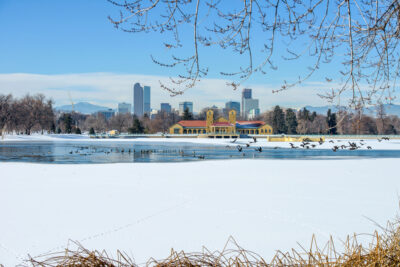Blog
Are Heat Pumps A Practical Solution for Cold Climates?

When it’s below freezing outside, older-model heat pumps cannot keep up once outside temperatures drop below freezing. In order to maintain a comfortable, consistent temperature, they require a backup source when temps are too low. Fortunately, heat pumps have evolved and can be used confidently in even the coldest weather.
Read on to learn more about choosing the best heat pump for the Denver Metro and surrounding areas.
Geothermal (Ground-Source) Heat Pumps
Although the air temperature may be below freezing, it typically stays between 45°F to 75°F below ground. Ground-source heat pumps use that heat from underground to warm your home.
Underground temperatures are consistent. The typical temperature range of 45°F to 75°F provides enough heat to draw from in colder weather and enough cold to pull from in warmer weather, making geothermal heat pumps an excellent choice for even more extreme climates.
Water-Source Heat Pumps
Water-source heat pumps can be installed less expensively than ground-source types and provide a more consistent temperature than air-source types. Some heat pumps use water from a lake or pond as their heat source. This could be a good option if you have a body of water on your property.
Air-Source Heat Pumps
The most popular type of heat pump uses outside air to heat your home. At one time, they were considered inefficient in extreme cold because the air temperature made it difficult to find heat to transfer inside. For older models, there wasn’t enough heat in the air to keep up. As previously mentioned, technology has solved that issue, and newer air-source heat pump models are ideal for our climate.
Modern air-source heat pumps feature improved coil designs, electric motors, and compressors. Thermostatic expansion valves enable precise refrigerant flow to the indoor coil. Variable speed blowers boost efficiency and counteract the adverse effects of dirty air filters and blocked ducts. Finally, copper tubing used in air-source heat pumps now has internal grooves to increase the surface area available.
Ductless, Mini-Split Heat Pumps
Ductless, mini-split heat pumps are great for homes with non-ducted heating systems (radiant panels, space heaters, etc.). Their primary advantage is that they are small and can be used effectively for system-based zoning. They can also be a good choice for homes where installing or adding new ductwork is not feasible.
Researching Your Options
- The updated Energy Star standard for air-source heat pumps, due to launch in January 2023, will include a certification mark for cold-climate heat pumps for the first time. The mark will signify that the heat pump model provides suitable low-temperature performance and efficiency.
- The Northeast Energy Efficiency Partnership (NEEP) publishes a list of heat pump models that perform efficiently in frigid weather.
- Call Indoor Air Quality, Inc. We’ve been helping customers in Highlands Ranch and throughout the Denver Metro Area choose the right heat pump for their needs for more than 20 years – and counting! We proudly offer top-quality Rheem products.
Indoor Air Quality, Inc. is Your Heat Pump Specialist!
To get answers to specific questions about how a heat pump system could work in your home, the energy savings you can experience, and more, turn to Indoor Air Quality, Inc. We invite you to review our customer testimonials and contact us for more information and a free quote.




